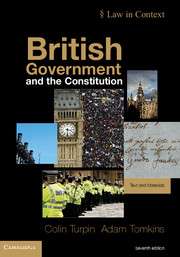Book contents
- Frontmatter
- Contents
- Preface
- Acknowledgements
- Abbreviations
- Table of Cases
- Table of Statutes
- Table of European Treaties
- Part I Constitution, state and beyond
- Part II Government
- Part III Accountability
- 8 Parties, groups and the people
- 9 Parliament and the responsibility of government
- 10 The courts
- Part IV Liberty
- Index
8 - Parties, groups and the people
from Part III - Accountability
- Frontmatter
- Contents
- Preface
- Acknowledgements
- Abbreviations
- Table of Cases
- Table of Statutes
- Table of European Treaties
- Part I Constitution, state and beyond
- Part II Government
- Part III Accountability
- 8 Parties, groups and the people
- 9 Parliament and the responsibility of government
- 10 The courts
- Part IV Liberty
- Index
Summary
This chapter and the following two are concerned principally with questions relating to accountability and, in particular, to the accountability of government. We have divided our discussion of accountability into three broad areas, although it is important to stress that these areas should be seen as operating with and alongside one another and not in opposition to one another. (However, this is not to say that there are no tensions between the various forms or institutional mechanisms of accountability.) In this chapter we consider what might rather loosely be called popular accountability and ask ‘what role or roles does the British constitution accord to its people?’. In chapter 9 we focus on questions of parliamentary accountability which, traditionally, has been the most important form of governmental accountability in the British constitutional order. In chapter 10 we consider the role of the courts in providing, for example, for mechanisms whereby government actions and decisions may be judicially reviewed.
The people in the constitution
An ideal conception of a democratic society is one in which the people continuously and actively participate in political affairs. In the real world, societies that fall short of this ideal are nevertheless termed democratic if by their constitutions the people freely elect a government and can at frequent intervals dismiss it and elect another. To this extent, at least, the constitution of the UK is democratic (see pp 49–58 above). Periodic elections provide for an accountability of the government to the people – in their role as the electorate – who have in this respect a place in the constitutional system.
- Type
- Chapter
- Information
- British Government and the ConstitutionText and Materials, pp. 517 - 565Publisher: Cambridge University PressPrint publication year: 2011

